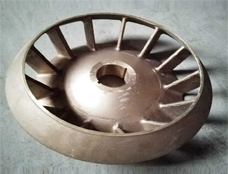+86 311 85258258
+86 311 85258258
May. 12, 2021
Top 3 Reasons For Impeller Failure
An integral part of a centrifugal pump is its impeller. Without the impeller, centrifugal force cannot be generated when liquid enters. Therefore, if there is no impeller, the centrifugal pump will not work at all. Therefore, the impeller of the pump must be properly maintained to prevent the pump from stopping and to ensure the maximum length of the pump's continuous operation. The top 3 most common causes of impeller failure are cavitation, erosion, and corrosion.
Cavitation is a huge danger, and any centrifugal pump is cavitation. "The common cavitation phenomenon on the pump impeller is caused by the pressure difference on the pump body or the impeller. When the partial pressure is lower than the saturation pressure of the fluid being pumped, the pressure in the fluid suddenly drops, and the liquid flashes. If not repaired as soon as possible, cavitation may quickly cause the impeller to disintegrate quickly. Similar to disintegration, erosion is also a cause, impeller failure.
Erosion of the impeller is usually caused by small, hard particles (such as sand) contacting the impeller, causing the entire impeller to gradually wear out over time. It is difficult to completely avoid the erosion of the pump part, but there are two main methods to reduce the erosion of the impeller: first, by "reducing the flow rate in each part of the pump", and secondly by "designing the pump in such a way that the flow rate through the close-running clearances is low." In addition to the erosion caused by solids, the corrosion of the pump impeller is equally dangerous, or even more dangerous.
Corrosion is usually due to low pH, usually around 2.0-3.0, which is very acidic. Over time, corrosion has basically eroded the components inside the pump. This is why the right impeller material is crucial: because if a pump's impeller is made of cast iron and corrosive fluids will be pumped, then the impeller will quickly deteriorate and may also cause other corrosive damage to the pump. In addition to frequently monitoring the condition of the pump when pumping corrosive fluids, other solutions to prevent pump failures include "adopting appropriate design parameters during the design phase and selecting appropriate materials for components such as impellers, valves, and pipe fittings." The coating reduces corrosion damage, improves pump efficiency and the economic life of the pump system.
In many cases, the best solution to the key problems plagued by centrifugal pumps starts in the pump design and planning stage. In the long run, choosing the most suitable components for the pump is crucial, even if it means spending more money on impellers or anti-corrosion coatings that use higher standard materials. Because these measures can definitely increase the durability and long-term efficiency of the centrifugal pump, reduce downtime, and continue to produce the same flow.
We are impeller suppliers. Please feel free to contact us if you are interested in our products.
